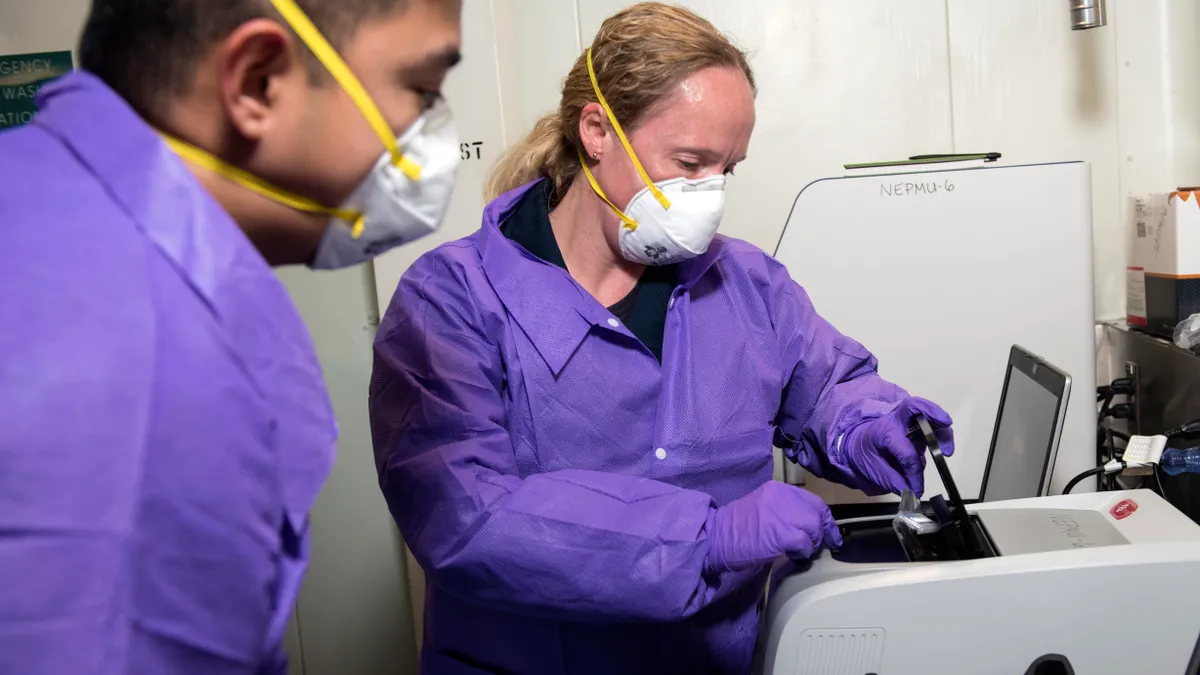Dive Brief:
- LabCorp on Wednesday reported first quarter revenues of $2.82 billion, up 1% from 2019. At the same time, the commercial lab giant withdrew 2020 guidance and temporarily suspended its share repurchase program due to the "unpredictability" of the ongoing coronavirus pandemic.
- Demand for testing at the end of the first quarter declined 50% to 55% compared to normal daily levels, with the reduction "heavily weighted" toward routine tests.
- CEO Adam Schechter said on the earnings call he expects the company will offset some of the volume shortfall by increasing capacity for its COVID-19 antibody testing, as well as for its molecular tests, including a self-collection specimen test kit offering for at-home use.
Dive Insight:
While LabCorp says it began 2020 with performance in line with expectations, the coronavirus public health emergency negatively hit testing volumes "broadly" at the end of the first quarter. The company blamed the sharp decline in demand for its test services on overall customer caution, government restrictions, and social distancing.
"The increased testing we performed for COVID-19 did not nearly offset the decline in other testing," according to Schechter, noting diagnostics revenue for the quarter fell to $1.7 billion, down 1.2% from the prior year.
Rival Quest Diagnostics, which last week reported first quarter revenues down 3.7% from 2019, saw its testing volumes decline by more than 40% during the last two weeks of March and also opted to pull its previous guidance for 2020.
To help mitigate the financial impact from the pandemic, LabCorp is reducing its cash outflows by putting off some capital expenditures, temporarily suspending its share repurchase program, as well as implementing furloughs and delaying hiring, among other actions. However, Schechter emphasized that the company is not planning large-scale job cuts and intends to "preserve jobs that we believe will be necessary in the future."
The exec tried to reassure investors that LabCorp's "volume reduction in the base business appears to have stabilized."
The company expects to offset some of the shortfall by quadrupling capacity for its coronavirus antibody testing from about 50,000 antibody tests per day currently to more than 200,000 tests per day by mid-May, as well as boosting existing daily capacity for its molecular COVID-19 diagnostics from 60,000 to 100,000 tests "as quickly as we can."
To date, LabCorp has conducted more than 1 million tests and is currently capable of performing 1.8 million per month, according to Schechter, as the company continues to build additional testing capacity.
LabCorp on Monday said its blood tests for detecting coronavirus antibodies will be available nationwide with no out-of-pocket costs with an order from a healthcare provider. The test will be administered at its nearly 2,000 patient service centers, more than 100 of which are at Walgreens locations, as well as physicians’ offices.
"There's still some debate, frankly, in the marketplace on how to utilize the serology tests," said Schechter. "My expectation is that we'll be able to use most of our serology capacity as we get in through the summer months and into the fall."
Regarding LabCorp's molecular test for COVID-19, FDA last week granted its first emergency use authorization for a coronavirus diagnostic test with an at-home sample collection option. The agency re-issued the EUA for LabCorp's test, first given in early March, to permit testing of self-swabbed nasal specimens by individuals using its home collection service called Pixel.
The at-home collection test kit is currently only available for healthcare workers and first responders but Schechter said the test will be rolled out more broadly in the coming weeks.
Nonetheless, Schechter noted that LabCorp's near-term goal of performing 100,000 molecular tests and more than 200,000 antibody tests per day is just a small slice of the roughly 530 million tests it does annually.
He warned that unless the company starts to see routine diagnostic test volumes revive it will be hard for LabCorp coronavirus testing to "make up for the difference."













